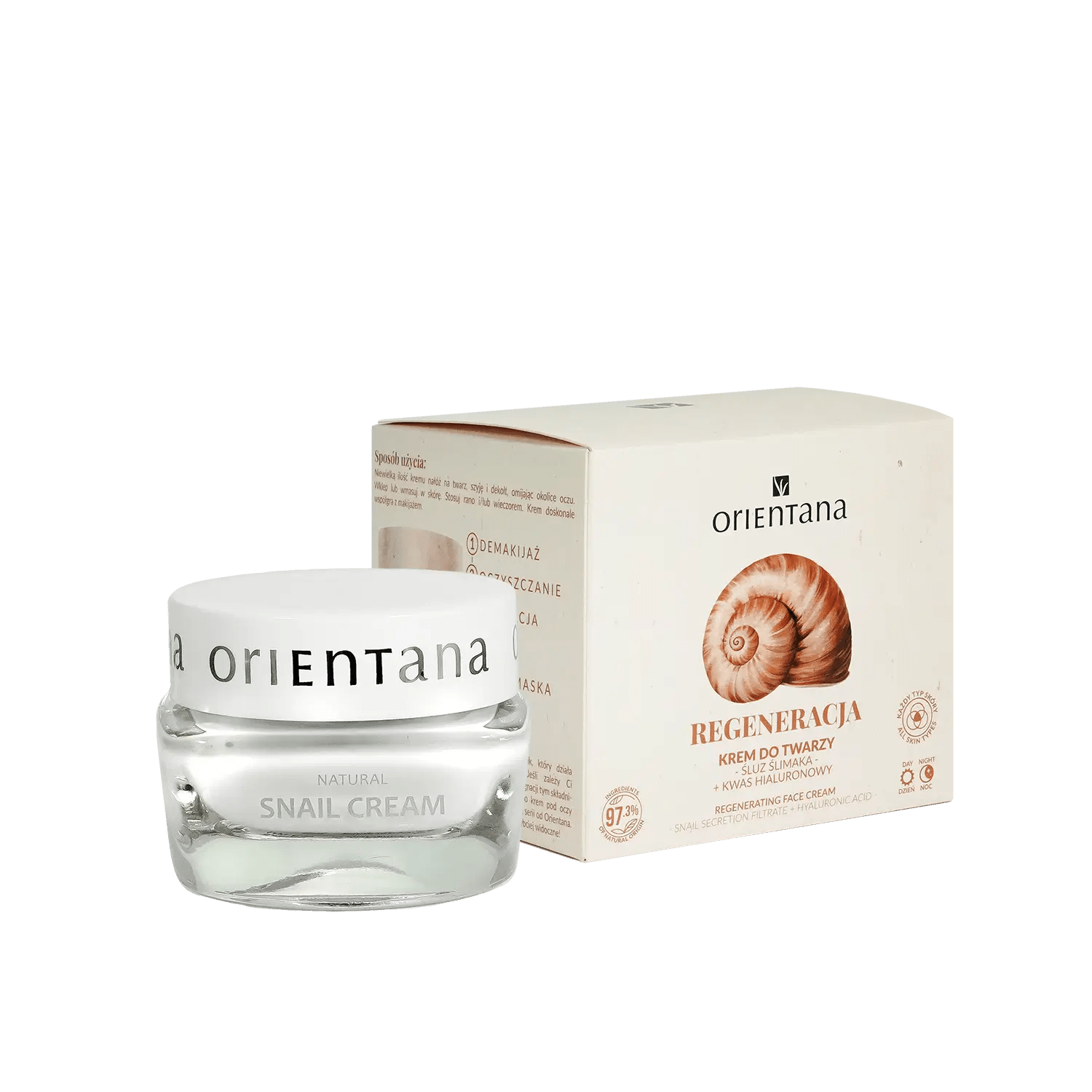Itchy scalp is a problem that affects many of us - it can be bothersome, hard to ignore and often recurs. It can appear regardless of age, gender or lifestyle. Sometimes it is just a temporary discomfort, other times - a signal that something more serious is happening to our skin. What to do when your scalp itches? First of all, it is worth knowing what can cause it, how to deal with it effectively and how to prevent it.
Common causes of itchy scalp
There can be many causes of itching, from trivial to requiring specialist intervention. The most common are:
- Dandruff – a classic culprit that can make life miserable and cause intense itching.
- Seborrheic dermatitis is a chronic, often recurring inflammatory skin disease characterized by scaling and itching.
- Cosmetic allergies – shampoos, conditioners, hair dyes and other products can cause allergies and irritate the skin.
- Dry skin – caused by e.g. frequent washing, air conditioning, heating or improper care.
- improper hair care - e.g. using too strong detergents that disrupt the skin's hydrolipid barrier
Often, it is enough to change the shampoo to a more gentle one to feel relief. That is why it is worth reading the list of ingredients to eliminate shampoos with aggressive sulphates such as SLS (Sodium laureth Sulfate) and similar. This change is one that will moisturize the scalp and repair the hydrolipid layer of the epidermis. TrychoLIczi moisturizing shampoo will work great.
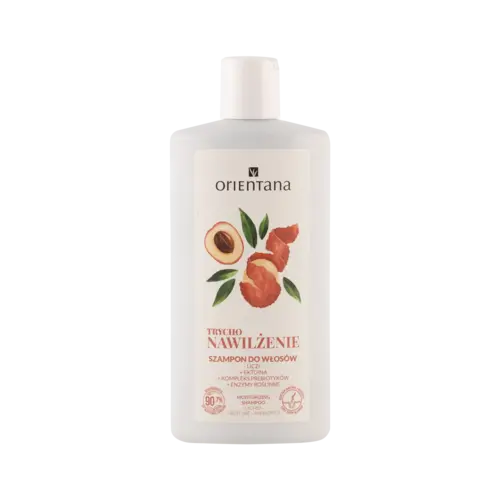
However, in many cases, a consultation with a trichologist is necessary. Sensitive skin can react after just one use of an inappropriate cosmetic. That is why an individual approach and an accurate diagnosis are so important - without it, it is difficult to achieve effective treatment.
Prevention: How to Prevent an Itchy Scalp?
Proper prevention can help avoid the problem of itchy scalp or at least alleviate its symptoms. Here are some proven methods:
-
Regular but gentle cleansing of the scalp
Cleansing your scalp is essential for its health, but it is equally important to do it gently and effectively. Wash your hair twice - this is the optimal number for thorough cleansing. An incompletely cleansed scalp can increase the intensity of itchy skin. Avoid scrubbing too hard and using aggressive cleansers, which can damage the skin's natural protective barrier and increase itchy skin. Avoid irritating ingredients in cosmetics
Choose products with a mild composition, free from alcohol, sulphates (SLS, SLES), and other potentially irritating substances that disrupt the scalp's microbiome. The best for the scalp gentle formulas of natural shampoos help maintain the skin's hydrolipid balance and minimize the risk of allergic reactions. -
A balanced diet to support skin health
A proper diet has a huge impact on the condition of the scalp. Include products rich in B vitamins and omega-3 fatty acids in your diet – they support skin regeneration, soothe inflammation and support the proper functioning of sebaceous glands. -
Moisturizing the skin, especially during the heating season
Dry air in winter and during the heating season can lead to dry scalp. Regular use of a moisturizing shampoo and proper hydration of the body - help maintain skin elasticity and as a result prevent skin flaking. -
Reduce stress for better skin condition
Mental stress has a direct impact on skin health. It can worsen symptoms such as itching, dryness, or excessive flaking. It is worth incorporating relaxation techniques, physical activity, or other forms of rest into your daily routine that support psychophysical balance.
When to see a specialist? If the itching does not go away despite home remedies, do not delay a visit to a specialist. A good trichologist will help identify the cause and choose the right therapy. Sometimes this is the only way to say goodbye to this persistent problem once and for all.
Diseases of the scalp
Dandruff and its effect on itching
Itchy scalp can be extremely bothersome. Although its causes can vary, dandruff is very often the culprit. It is not only unsightly white flakes on clothes, but above all a dermatological problem related to excessive exfoliation of the epidermis. The main culprit is the Malassezia fungi, which normally live in balance on our skin. However, when the conditions are favorable for their development, they begin to multiply rapidly, which leads to:
- skin irritations,
- inflammatory skin disease
- persistent itching of the scalp.
Understanding the causes and mechanisms of its action is the first step to effective treatment and preventing relapses – which, unfortunately, are very common.
Seborrheic dermatitis (SD)
Seborrheic dermatitis (SED) is a chronic inflammatory disease that often affects the scalp. Its development is associated with excessive sebum secretion and the presence of Malassezia fungi. SED is symptoms of itching, redness and flaking of the skin - especially in areas with high sebaceous gland activity: on the head, face and chest.
Although scleroderma is often confused with dandruff, it is different in that it is chronic and has more severe symptoms. That is why it is so important to make an accurate diagnosis. Treating scleroderma requires not only relieving symptoms, but also identifying and controlling factors that exacerbate inflammation, such as stress, poor diet, or hormonal fluctuations.
Atopic dermatitis (AD)
Atopic dermatitis (AD) is a chronic allergic disease that often affects the scalp. The most bothersome symptom is intense itching, which leads to a vicious circle: the more it itches, the more we scratch, which only worsens the skin condition. AD often co-occurs with other atopic diseases, such as asthma or allergic rhinitis.
In the treatment of atopic dermatitis, daily, conscious care is crucial, which includes regular lubrication of the scalp, avoiding allergens and irritants, as well as a properly selected diet.
Effective treatment of atopic dermatitis requires an individual approach. It is necessary to take into account not only the skin symptoms, but also the general health and lifestyle of the patient. Each atopic skin is different - and requires different support.
Psoriasis of the scalp
It is a chronic autoimmune disease in which the skin produces new cells too quickly. This results in thick, silvery scales, redness, and severe itching of the skin. Symptoms are particularly severe in winter, during periods of stress, but also after using inappropriate cosmetics.
Treating itchy skin caused by psoriasis is a long-term process. It requires a comprehensive approach that may include: topical therapies (e.g. corticosteroid ointments), systemic treatment - in more severe cases, and psychological support, as the disease often affects mental well-being.
The better we understand the chronic nature of psoriasis, the more effectively we can control it. And that means a better quality of life – despite the disease.
Fungal infection of the scalp
Ringworm of the scalp is an infectious disease caused by dermatophytes – fungi that attack the skin, damaging the scalp microbiome, leading to itching, flaking and hair loss.
Fungal infections can be easily transmitted from both humans and animals. They are particularly dangerous in places where many people gather, such as schools, kindergartens and sports clubs.
The key is to start treating itchy skin quickly. The more we know about mycosis, the easier it is to recognize, treat effectively and prevent recurrence.
Other possible causes of scalp itching
symptoms of itchy scalp can be extremely bothersome and do not always result from obvious causes. Sometimes the source of the problem lies deeper – in less obvious but equally annoying factors. Understanding the cause of itching is the first step to effective treatment and improving the quality of life. Sometimes it can also lead to the discovery of health problems that we did not consider before.
Contact allergy and reactions to cosmetics
Contact allergy is a reaction of the immune system to ingredients contained in hair care cosmetics. It manifests itself with itching, burning, redness, and sometimes also flaking of the scalp. The most common allergies are SLS/SLES/ALS, preservatives, alcohol and fragrances, and sensitive scalp can react in such a way that the intensity of the itching of the skin is unbearable.
Recently, there has also been a reaction to Cocamidopropyl Betaine, which in large quantities can be irritating, especially on damaged or very sensitive skin. If your skin reacts badly to Cocamidopropyl Betaine, use shampoos without this ingredient.
Dry scalp and care mistakes
Dry scalp is a common but often underestimated cause of itching. It can be caused by a breach of the hydrolipid layer of the scalp. As soon as symptoms of itchy skin appear, it is worth reaching for a scalp moisturizer. What cosmetics moisturize? Moisturizing shampoos, greasing the scalp with special oils, hair serum. It is worth mentioning proper washing and rinsing. Avoid hot water and intensive scrubbing, because they intensify dryness. A small change in daily care can bring great relief.
Folliculitis
Folliculitis is an inflammatory condition that manifests itself with painful spots, redness, and intense itching. It is most often caused by bacteria, fungi, mechanical or chemical irritations. Factors that contribute to the development of inflammation include tight headgear, poor hygiene, and aggressive cosmetics. Folliculitis should be treated. Failure to respond can lead to worsening of the skin condition and more difficult treatment.
Lice and scabies
Lice and scabies are parasitic diseases that can cause severe itching of the scalp. However, they differ in cause and treatment. Both diseases are very contagious, and it is usually necessary to treat all household members, disinfect bedding, clothes and hairbrushes, and strictly follow the doctor's instructions.
Scalp Neuropathy and Neurological Factors
Scalp neuropathy is a rarer but possible cause of chronic itching that is not dermatological. In this case, the problem is damaged or oversensitive nerves, incorrect signals are sent to the brain, and symptoms include tingling, burning, or even numbness. scalp disease requires consultation with a neurologist. In this case
It is worth asking: are there any other, lesser-known factors that affect the health of the scalp? Certainly, the development of modern diagnostic methods, which are already available in trichology offices, will soon allow us to identify the sources of itching more quickly and accurately.
Factors that increase itching
Itchy scalp is extremely bothersome – it appears suddenly or develops gradually, but it can always effectively make life miserable. What factors can increase itchy scalp?
Contrary to appearances, cosmetics are not always to blame. Often, invisible factors, such as stress or scalp microbiome disorders, are the cause. Understanding how they work is the first step to relieving symptoms.
- Stress and its effect on the scalp
Stress is an invisible but very real enemy of our skin. As a psychological stimulus, it triggers hormonal reactions that affect the entire body - including the scalp. An increase in cortisol levels increases the skin's susceptibility to inflammation, which can lead to intense itching. How can you protect yourself from this factor? You don't have to go to the mountains right away. Just find a few minutes every day for meditation or breathing exercises, a leisurely walk in the fresh air, or yoga or stretching in the comfort of your home. Taking care of your psyche also means taking care of your skin. Although it may sound trivial, regular relaxation techniques bring surprisingly good results in reducing itching.
- Scalp Microbiome Disorders
The scalp is a complex ecosystem inhabited by billions of microorganisms. This microbiome supports the skin's protective barrier and protects it from harmful external factors. Sensitive scalps are particularly susceptible to microbiome disruption. When the balance is disrupted, itching of the skin begins to intensify and, if left untreated, can lead to inflammation of the scalp.
What can disrupt the balance of the microbiome? aggressive shampoos, frequent chemical hair dyeing, a diet poor in vitamins and nutrients, hormonal changes, e.g. during puberty or menopause.
How to restore the balance of the microbiome? with mild natural shampoos, hair cosmetics containing probiotics or prebiotics - these ingredients are in the entire Orientana Trycho Lychee hair series. Support the natural bacterial flora of the skin, instead of fighting it. A healthy microbiome means less itching and more daily comfort. It is therefore worth taking care of the biological balance of the scalp - it is an investment that quickly pays off.
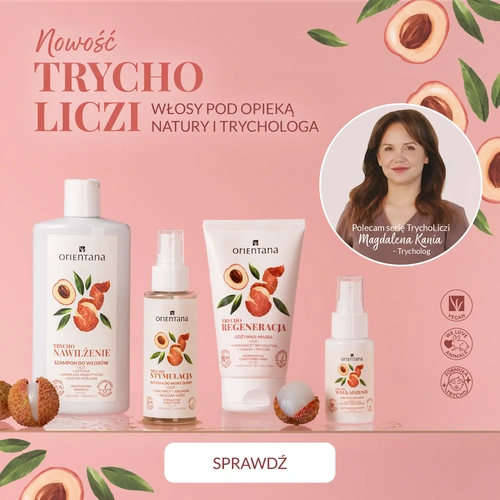
Diagnostics and when to see a specialist
When the intensity of itching of the scalp increases, it is a signal of more serious problems, such as skin diseases, allergic reactions or infections. This is why accurate diagnostics are so important, which allows you to determine whether and when you should consult a specialist - a dermatologist or trichologist.
Not every itch requires medical intervention. However, if the symptoms persist, worsen, or are accompanied by other worrying symptoms – such as flaking skin, redness, or excessive hair loss – it is worth seeing a specialist as soon as possible and starting treatment for itchy skin.
Accompanying symptoms and their interpretation
Itchy scalp rarely occurs on its own. It is usually accompanied by other symptoms that can help identify the cause of the condition. The most common are skin redness, flaking of the skin - often associated with dandruff, but may also suggest a fungal infection or seborrheic dermatitis, and hair loss - may be the result of chronic itching and damage to hair follicles.
Careful observation of symptoms allows for a better understanding of what is happening with the scalp and thus the selection of effective treatment. This in turn means faster relief and a lower risk of relapses.
One of the more disturbing effects of chronic itching is hair loss. While it may seem like these two problems are unrelated, in fact, they often occur together. Why ? Constantly scratching your scalp damages hair follicles, weakens hair structure, and leads to hair loss.
It is not worth ignoring the symptoms of scalp inflammation. The sooner you react, the greater the chance of stopping hair loss and restoring balance to the scalp. And hair? It can also regain its former shape and healthy appearance.
When to consult a dermatologist or trichologist?
It is not always easy to judge when to see a dermatologist or trichologist. Sometimes the symptoms are mild, and home remedies – such as changing cosmetics or using natural oils – bring temporary improvement. However, if the itching does not subside despite using home remedies, the symptoms intensify, and additional symptoms appear, such as flaking, redness or hair loss, it is not worth delaying a visit to a specialist. Early diagnosis is not only a chance for faster recovery, but also a way to avoid more serious complications – such as permanent damage to hair follicles or chronic inflammation.
A dermatologist or trichologist will help you choose the right cosmetics, treatments and procedures that will be tailored to the needs of your skin and hair. It is not only a therapy, but also an effective prevention - thanks to it, you can enjoy healthy skin and strong hair for a long time.
Effective Ways to Relieve an Itchy Scalp
There are many effective methods that provide relief and support the treatment of itchy skin. Find out what really works and why it is worth acting immediately.
Anti-dandruff shampoos and their active ingredients – Orientana Neem and Green Tea Shampoo
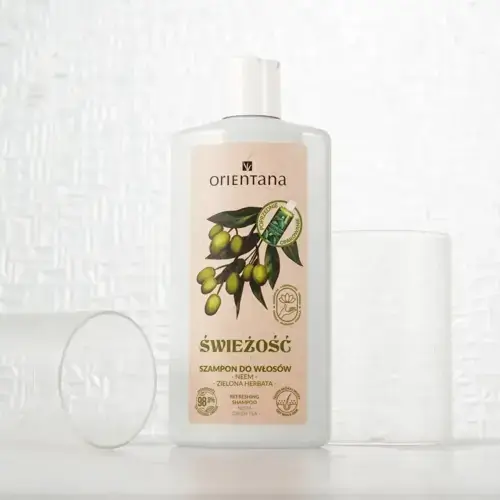
In the case of dandruff and persistent itching, it is worth reaching for an anti-dandruff shampoo - this is one of the simplest and most effective solutions. A good choice is the Orientana Neem and Green Tea shampoo , which combines natural ingredients with dermatological action. In its composition you will find natural active substances, known from Ayurvedic medicine. This combination of ingredients works not only symptomatically, but also causally - it fights the source of the problem. If you are struggling with recurring dandruff and itching, this shampoo may be the perfect solution.
Moisturizing shampoos and emollients
Dry, tight scalp that itches and burns? In this case, intensive moisturization is key. Moisturizing shampoos, such as Trycho Lychee from Orientana , will be helpful, created with the regeneration and soothing of the skin in mind. Its effectiveness is based on modern trichological ingredients such as ectoine, gluconolactone or lactic acid. Thanks to them, moisture is retained in the epidermis. Centella asiatica soothes irritations and reduces the feeling of itching.
This is especially important for people with a tendency to dryness or suffering from atopic dermatitis (AD). Sensitive scalp will also thank you for regular use of such a shampoo.
Natural Ways to Soothe an Itchy Scalp
An itchy scalp can be extremely annoying. Fortunately, there are natural, home remedies that can provide relief. Below are some tried-and-true methods to try to relieve itching and improve the condition of your scalp.
- Tea tree oil
Tea tree oil is a natural agent with strong antifungal and antibacterial properties. It effectively eliminates microorganisms that cause irritation, while also having a soothing effect — it relieves itching, reduces redness, and brings immediate relief.
Ways to use the oil:
- Add a few drops to your daily shampoo to enhance its effects.
- Dilute the oil in a carrier oil (e.g. coconut) to avoid irritation.
- Massage the prepared mixture gently into the scalp, leave for a few minutes, then rinse.
Use regularly, preferably several times a week. Results? Less itching, more comfort and a noticeably healthier scalp.
- Apple cider vinegar
Although it may seem unusual, apple cider vinegar is one of the most effective home remedies for an itchy scalp. It has antifungal properties, restores the skin's natural pH and helps reduce irritation and discomfort.
How to make an apple cider vinegar rinse:
- Mix apple cider vinegar with water in a 1:1 ratio.
- After washing your hair, apply the solution directly to your scalp.
- Leave on for a few minutes, then rinse thoroughly with lukewarm water.
Regular use of this method helps restore balance to the scalp, calm its reactions and improve the overall condition of the hair, which gains a natural shine.
- Coconut oil
When your scalp is dry and itchy, it's worth reaching for coconut oil. It's a natural moisturizer with antifungal properties that effectively soothes and regenerates irritated skin.
How to use coconut oil:
- Apply a small amount of oil directly to your scalp.
- Massage gently with your fingertips to stimulate circulation and aid absorption.
- Leave it on for a few hours or, for better results, overnight, then wash your hair.
Regular use of coconut oil not only relieves itching but also prevents its recurrence. Additionally, hair becomes soft, shiny and noticeably healthier.
A lifestyle that supports a healthy scalp
A healthy scalp is not only the result of using the right cosmetics. It is also the result of everyday choices – both small and large – that affect our well-being and the overall condition of our body. Sometimes just a few simple changes are enough to notice the difference: less itching, less irritation, and hair in much better condition.
Let's take a closer look at how proper diet and stress reduction techniques can support scalp health and help avoid many troublesome problems.
A diet rich in vitamins and minerals
What we eat has a direct impact on the condition of our skin – including the skin on our heads. A balanced diet, rich in vitamins and minerals, is the foundation for a healthy, well-hydrated scalp. Key nutrients include:
- Vitamins A, C, D and E – support cell regeneration and strengthen the skin's protective barrier.
- Zinc – regulates sebum secretion, which helps prevent oily skin and inflammation.
- Selenium – has an antioxidant effect and supports the health of skin and hair.
It is worth including products that are a natural source of these ingredients in your daily menu:
- walnuts,
- pumpkin seeds,
- oily sea fish,
- spinach,
- avocado.
Vitamin E acts as a natural shield – it protects cells from oxidative stress. Zinc helps maintain a balance in sebum production, which can limit oiliness of the scalp and reduce the risk of inflammation.
A well-balanced diet can also alleviate symptoms such as itching or flaking of the skin. This is especially important for people with dermatological problems such as dandruff, atopic dermatitis (AD) or other scalp conditions.
Meditation and stress reduction techniques
While it may seem surprising, stress has a real impact on the condition of the scalp. High levels of cortisol, the stress hormone, can increase inflammation, cause dryness, itching, and even contribute to hair loss. That's why stress reduction techniques are not only a way to improve your mood, but also to a healthier scalp.
Regularly practicing relaxation techniques has a soothing effect on the nervous system, which can reduce stress-related skin symptoms, such as itching or excessive dryness.
It’s worth asking yourself: what can I do today to feel better – not just mentally, but physically? Sometimes 10 minutes a day is enough. It could be aromatherapy, a scalp massage, or just a moment of silence among the trees. Experiment, listen to your body, and see what works best for you.
Itchy scalp after dyeing
Changing your hair color is a great way to refresh your image and express yourself. Unfortunately, every transformation can come with a price – and it literally has to be paid on your own skin. Itchy scalp after dyeing is a common problem that can effectively take away the joy of your new look.
The most common cause is the chemical ingredients in dyes, which can irritate the skin or cause allergic reactions. Sometimes the symptoms are limited to mild discomfort, other times they can develop into more serious dermatological problems. It is therefore worth knowing what can cause such reactions and how to protect yourself from them. Let's check how to take care of the scalp during coloring.
Allergic reactions to hair dyes
One of the most common causes of itching after dyeing is allergic reactions to hair dye ingredients. Symptoms can include mild itching, burning, redness, and even swelling of the scalp.
The most common culprit is paraphenylenediamine (PPD) – a strong allergen present in many paints, especially those in dark shades.
Importantly, an allergy can appear suddenly, even in people who have never had any problems with dyeing their hair before. The immune system can react unexpectedly – even after years of using the same dye. That is why an allergy test before each coloring is an absolute must.
A good solution is natural hair dyes, for example Bio Henny Orientana. They not only change the color of the hair but also take care of the scalp, thicken the hair and make it shiny and healthy looking.

How to prevent irritation after chemical coloring? Use soothing cosmetics - shampoos and conditioners designed for colored hair not only protect the color, but also support the regeneration of the scalp. Give your skin time to regenerate. Too frequent coloring and hairdressing treatments can lead to chronic irritation and weaken the skin's protective barrier.
The transition to natural coloring really makes a difference. With henna, the new color is not only a change in the mirror, but also the comfort and health of the scalp.
Scalp care as an element of prevention
Scalp care is not just a matter of aesthetics – it is the basis for healthy, strong hair. If you care for the skin on your face, do not forget about the skin on your head. It is on its condition that depends whether you will avoid problems such as itching, dandruff or excessive oiliness of the hair.
Good scalp care involves maintaining the hydrolipid balance, microbiome health and cleanliness, while not irritating and supporting the skin’s natural functions. This is the foundation of healthy hair – even the best cosmetics will not work to their full potential if the scalp is neglected.
The key element of prevention is the selection of appropriate cosmetics, regular washing of hair, use of trichological peelings and moisturizing conditioners, these are simple but effective steps that have a real impact on the health of the scalp. Because a healthy scalp is not only comfort - it is also the secret of strong, shiny hair.
How daily habits support scalp health? Your daily habits have a huge impact on the health of your scalp. Sometimes just a few small changes can help you see improvements and prevent more serious problems in the future.
Here are some key principles to incorporate into your daily routine:
- Wash your hair in moderation – too often can dry out your skin, too infrequently leads to oiliness and inflammation. Find the balance that suits your needs.
- Proper water temperature – lukewarm water is best. Hot water can damage the skin’s protective barrier and increase irritation.
- Moisturizing cosmetics without aggressive ingredients - have a positive effect on the microbiome and the hydrolipid barrier of the scalp
- Protection from external factors – wear a hat in summer, a cap in winter, protect your skin from wind and dry air.
It's the daily choices that matter the most. Think about what you can change today to make your scalp healthier and your hair more beautiful.


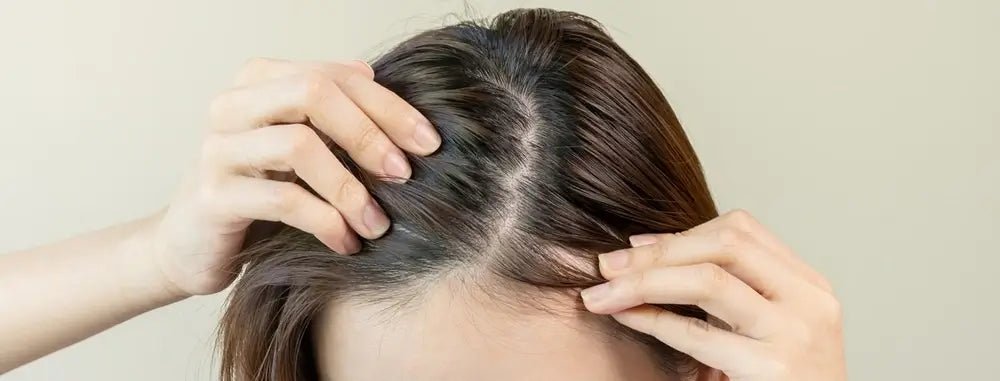
![Prezent dla Dziadka - pomysły, które naprawdę ucieszą [2026]](http://orientana.pl/cdn/shop/articles/prezent-dla-dziadka-kosmetyki-orientana_1236b498-20ac-42f5-a1cf-9dbb53180656.webp?v=1768157329&width=1100)


